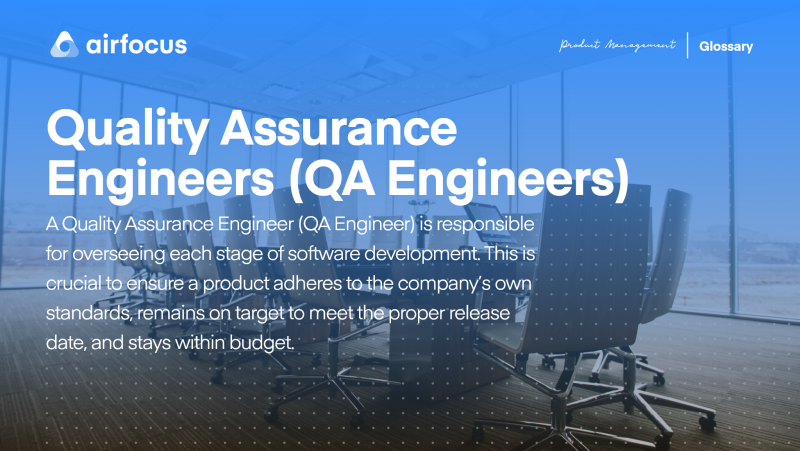Quality Assurance Engineers (QA Engineers)
What are quality assurance engineers, and what is a QA’s role in product teams?
They are often a bridge between stakeholders and developers, interacting with the development team. From strategic planning meetings with product owners, to one-on-one sessions with developers to understand an issue with the product, QA engineers will constantly be communicating.
Learn how product leaders collaborate with QA engineers to deliver quality, speed, and customer trust. Plus, find out how airfocus helps align teams around shared goals.
What are quality assurance engineers?
Quality Assurance Engineer definition
A Quality Assurance Engineer (QA Engineer) is a key player in the software development and distribution lifecycle. QA engineers ensure every aspect of a product adheres to the organization’s specified quality standards and requirements before a release.
Quality assurance (QA) engineers are crucial strategic partners for product leaders. They help teams achieve quality, velocity, and customer trust.
But what do quality assurance engineers do? They test, automate, and validate across a product’s lifecycle, enabling companies to release products that meet strict success criteria.
QA engineers balance speed and quality in iterative releases, identifying issues that could affect the user experience and a product/feature’s reception.
Why QA is essential for product success
Why are quality assurance engineers so important in determining a product’s impact? Their hard work can mean all the difference between a product that continually fails to meet user needs and a long-term success story.
Let’s look at three reasons why the QA role in product teams is so important.
Protecting customer trust
A QA engineer helps product teams avoid defects that could negatively impact the user experience. Everything from minor technical glitches to serious navigation issues could all hinder a product’s long-term market success. The more problems a product has, the more reason customers have to ignore it once word of mouth spreads.
With a QA engineer spotting defects and leading teams to fix them, users are more likely to be satisfied with a product over time. And if their experience is consistently positive, users may stay loyal to the product and the brand by extension. As a result, QA engineers help companies retain customer trust and turn users into advocates.
Reducing long-term tech debt
When looking for faster solutions in product development, companies must consider technical debt carefully. Choosing the easier path over the more effective one — just to save time — can cost you in the long run.
QA in agile product development can help businesses avoid long-term technical debt. Engineers spot issues early in a product’s lifecycle and prevent them from becoming major issues for users. Products can then better meet the required standards, and companies can develop a proactive — rather than reactive — approach to problem resolution.
By using tried-and-true QA methods, such as continuous integration and testing automation, engineers prevent potentially costly flaws.
Supporting continuous delivery
By embracing continuous delivery, organizations can release features in a fast yet sustainable way that adds extra value to products. But committing to continuous delivery isn’t all about velocity. Quality must be a focus, too. Users may appreciate receiving new features on a regular basis, but not if they’re clearly rushed and below the standard they expect.
You should have a rigorous testing structure in place to ensure that speed never comes at the expense of quality. This is true no matter how big an organization becomes. Growing teams using continuous delivery should implement scalable testing processes that fit their evolving methodology and needs.
How product leaders and QA collaborate effectively
What are quality engineers and product leaders doing to deliver better solutions? Let’s look at how they collaborate at different stages of product development.
During discovery and scoping
QA engineers and product leaders who collaborate from the discovery stage onward can position testing as an indispensable part of the product strategy.
They ensure that testability is checked off the list before a project can be considered complete. It won’t be an afterthought, but rather a key determinant in a project’s success.
During roadmap planning
When planning roadmaps, leaders should be aware of the QA role in product teams, factoring it into the various steps and milestones of the development process. They should also ensure that there’s enough time, capacity, and investment for QA to be realistically involved.
As a product leader, ensure that resources are allocated strategically to QA testing. If it’s left until the last minute, or there isn’t enough investment, QA engineers may not find all the defects they would if they had the proper support.
During prioritization
When prioritizing features, QA engineers and product leaders should work together to keep quality at the forefront. This is especially important when scoring features based on impact vs. effort. If a new addition is easy to implement but likely to frustrate users, QA will help rule it out before any resources are allocated.
By asking how new features might negatively impact the product’s performance, value, and user satisfaction, QA engineers and leaders can focus on delivering valuable updates.
When using product prioritization templates, no matter the framework used, involving QA throughout helps teams make better decisions centered around the user. But the QA team should also be part of cross-functional prioritization tasks. Their input is invaluable for emphasizing quality in different areas.
During OKR planning and measurement
Product leaders and QA engineers should identify the right quality metrics when establishing objectives. Common quality metrics include:
Defect density: The number of defects discovered
Test coverage: The extent of testing on the codebase and its functionality
Priority index: Measuring the weighted importance of unresolved defects, ensuring top-priority flaws are addressed first
Bug reopen rate: How often bugs thought to be resolved are reopened
Escaped defects: The number of defects that users find after a product’s release
Involving the QA team and quality metrics in product OKRs planning and goals aligns the team and enables accurate success measurement. Using the best OKR software tools streamlines the process and offers a reliable monitoring solution.
Examples of QA impact on product teams
What benefits do quality assurance engineers offer product teams? Here are three examples of their impact.
Early bug detection and faster feedback loops
The sooner bugs are found, the sooner they can be fixed. Allowing a product to reach users with noticeable flaws could negatively affect its launch, cause reputation damage, and lose customer trust. QA engineers involved in product development can detect bugs early and address them.
They may also create faster feedback loops, putting user input to good use and cultivating a better product overall.
Backlog prioritization based on customer-reported issues
Collecting feedback is paramount to consistently delivering new features that fit the users’ needs and goals. With QA on board from the start, customer-reported issues receive the attention they deserve sooner rather than later.
Confidence in scaling releases
Product leaders may feel concerned about scaling velocity in continuous testing and delivery, especially if there’s a risk that speed will be prioritized over quality.
However, establishing strong QA practices can change all that. Leaders can push velocity further without worrying about impacting quality.
How airfocus supports quality alignment across teams
airfocus, the AI-powered product management platform, can improve alignment and collaboration in companies of all sizes.
Use visual roadmaps to communicate product vision: Create strategic, lean, bespoke roadmaps to make a product’s purpose clear to everyone.
Integrate quality risk with diverse scoring frameworks: Use various frameworks, such as the weighted decision matrix, to assess risk when planning new features.
Streamline product planning and updates: Leverage airfocus’ comprehensive templates and AI Assist to save time, freeing up space in your schedule for critical tasks.
Build products your customers can trust
When product leaders recognize the importance of QA in agile product development, teams can deliver better products with less risk of customer-reported issues, disappointment, and reputation damage. And airfocus helps product teams achieve better alignment, prioritization, and planning.
Want to see how airfocus could transform your team’s process? Book your personalized demo now.

General FAQ

Glossary categories
Experience the new way of doing product management

Experience the new way of doing product management







